Theoryland Resources
WoT Interview Search
Search the most comprehensive database of interviews and book signings from Robert Jordan, Brandon Sanderson and the rest of Team Jordan.
Wheel of Time News
An Hour With Harriet
2012-04-30: I had the great pleasure of speaking with Harriet McDougal Rigney about her life. She's an amazing talent and person and it will take you less than an hour to agree.
The Bell Tolls
2012-04-24: Some thoughts I had during JordanCon4 and the upcoming conclusion of "The Wheel of Time."
Theoryland Community
Members: 7653
Logged In (0):
Newest Members:johnroserking, petermorris, johnadanbvv, AndrewHB, jofwu, Salemcat1, Dhakatimesnews, amazingz, Sasooner, Hasib123,
Theoryland Tweets
WoT Interview Database
Home | Interview Database
Interviews: Theoryland: An Hour with Harriet McDougal Rigney
Summary:
Entries
23
Date
Apr 21st, 2012
Type
Verbatim
Location
Roswell, GA
TourCon
JordanCon 2012
Reporter
Matt Hatch
Links
-
1
Matt Hatch
I'd like to thank Harriet McDougal Rigney for taking time during the most recent JordanCon in Atlanta to speak about her life with me and my wife. Also, I'd like to express my gratitude to those that helped craft the questions and worked to make this interview happen. You'll note that I ramble a bit, as I tend to be less comfortable with formal interviews (unless it involves interviewing authors about the Wheel of Time) and lean on the informal and conversational. Finally, as much as we tried, this transcript cannot convey how enjoyable it is to speak with Harriet; she is very warm, engaging and demonstrative as she speaks and has quite the knack for story telling.
Please sit back and enjoy an hour with Harriet.
-
2
Matt Hatch
Can you tell us a little bit about what it was like to grow up in Charleston?
Harriet McDougal
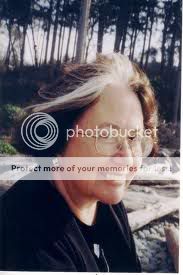
Photo by Jim Rigney
Yeah, it was hot! I had relatives all over the place, so there was a wonderful sense of extended family. There were many notions about what girls should and shouldn't do—that was not so hot—but that was very ingrained. I was a late-born child—my mother was forty-two when I was born—so her attitudes were those of an earlier generation. And mostly, I got along...it was a happy childhood.
Matt Hatch
What was it that girls could and couldn't do? What comes to mind when you think about that?
Harriet McDougal
Well, it was more...I was raised to "marry well", meaning money. And actually not money nearly so much as land, and proper blue blood, which in this case meant Confederate...and not much idea at all of a woman making independent money, unless it was as an artist or a writer. But there were no jobs; you could be a secretary. Wonderful. But that was not what I was raised to do.
Matt Hatch
You said you had family, so siblings? How many siblings?
Harriet McDougal
I had one sibling, a full sister who was twenty years older than me, and she was the only one.
Matt Hatch
And she's since passed away?
Harriet McDougal
Yeah, she has gone. And she was very good to me.
Matt Hatch
Yeah? What's your favorite memory of her?
Harriet McDougal
Oh gosh, a lot. I loved her Christmas presents. She lived in Chattanooga, not in Charleston; she married when I was three. She was just a nice, younger woman in my life, and with my mother being that much older, she was a friend.
Matt Hatch
So did you have any nieces and nephews through her?
Harriet McDougal
Yes, a niece and a nephew.
Matt Hatch
And they are still...
Harriet McDougal
No, the nephew's dead, and the niece lives outside of Charleston. She has two sons.
Tags
, , -
3
Matt Hatch
So you still have family [in Charleston]?
Harriet McDougal
Yeah, and I've got cousins you wouldn't believe.
Matt Hatch
From the quantity of cousins?
Harriet McDougal
Yeah, yeah...and very nice. I love them.
Matt Hatch
A lot still live in Charleston?
Harriet McDougal
Yeah.
Matt Hatch
Do you have family events?
Harriet McDougal
Well we see them at Thanksgiving, Christmas—funerals these days—and also a lot of them, one main group are members of a very peculiar and politically not very correct—actually, it's getting more correct all the time—organization called the Society for the Preservation of Negro Spirituals, which is gaining considerably more attention as a very legitimate preservation society of a very important folk song ethic, and I love to sing the things.
Matt Hatch
Oh really?
Harriet McDougal
Yeah, and there are now what are called rehearsals, and they used to have a once-a-year concert which was so peculiar. People dressed up like Miss Ann and Mr. Charlie, you know, in ball dresses, and we'd sit on the stage pretending to sing like African Americans, but not blackface—I don't mean that—but doing a thing called "shouting and lining", which is a traditional way of singing, and the whole point of the one concert was to raise money to buy the booze and the potato chips for the rehearsals throughout the year, which were once-a-month sing-alongs at people's houses, and when I was a little girl I'd hear these voices coming up the staircase. I loved the music from then on.
Matt Hatch
So music was always a part of your life?
Harriet McDougal
In that way—singing.
Matt Hatch
And do you still sing?
Harriet McDougal
Only in the back of the Spiritual Society. I sing in church on Sunday. It's not anything people would ever really, really want to listen to, but I love to do it.
Matt Hatch
I grew up in a very...my parents were singers, so I grew up around...
Harriet McDougal
Oh, so they were good?
Matt Hatch
(laughs) They were very good. Well I mean, you can imagine...we had those kinds of moments where everyone...you'd hear that. I mean, you'd hear singing all the time, and they wanted us to sing; singing was very much a part of my upbringing.
Tags
, -
4
Matt Hatch
Now, did you grow up in the house where you live now?
Harriet McDougal
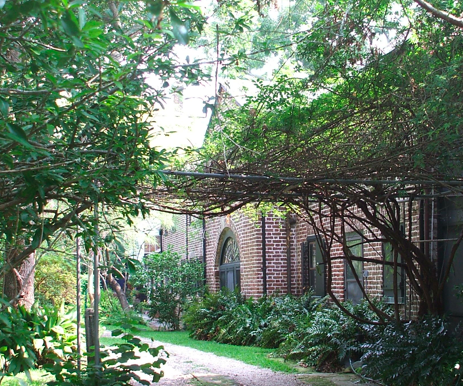
The carriage house
Yes. I began...my first memories are of Chapel Hill, North Carolina. My father had been stationed at Pearl Harbor when the attack came, but he was on a troop transport going one way or another from Pearl; I don't know which way he was headed. He was then stationed at the University of North Carolina running a huge NROTC program. Two years later, he was ordered to the Pacific, and mother brought me back to Charleston; she had bought the house that I now live in—as we say, she had "bought it in" from her sister and brothers when her mother died the year I was born, and Daddy was fortunately at sea, because she took out a mortgage, and if he had been on land, he'd have killed her. He had a horror of debt, and would never have agreed to that, but she just trotted over to the bank and did it. And so we came back—the house was rented, and we lived in the carriage house, which was Jim's office much later. And then when the tenant—I've forgotten what he did; he left Charleston, or he died, or whatever—we then moved—oh, Daddy came home, is what happened—and we moved up to the Navy Yard, which was a huge...it had had forty thousand employees during the World War. He was made acting Commandant of the Navy Yard, and we lived out there for a while.
Matt Hatch
And you held on to the home land, or rented it out?
Harriet McDougal
Yeah, and he was acting Commandant—they didn't make him full Commandant; he had thirty-seven years in, and they knew he wanted to retire in Charleston because of mother's enormous family being there—so we moved all the way ten miles down the road. And I never had the Navy experience of bopping from school to school, and all that stuff.
Matt Hatch
How long were you out of the house then, before you moved back in?
Harriet McDougal
I don't remember. Maybe a year, maybe two years.
Matt Hatch
So it was your mother that owned that; she was the one that went and bought it, and then obviously when your father came back, he was okay with this?
Harriet McDougal
Oh yeah, yeah. And he knew he wanted to retire in Charleston.
Tags
, -
5
Matt Hatch
Can you tell us a little bit more about your mother? What she did, how she influenced you?
Harriet McDougal
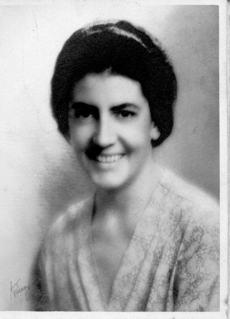
Louisa McCord Popham
Yeah. She was a beauty, and she sang and whistled, sort of like the Irish song about the Whistling Gypsy. She was quite an irresistible character; tremendous charm. She was a wonderful cook and hostess. She wasn't much on intimate warmth, but she was great really, in every way. She sewed. They never had a whole lot of money. We had a grand house at the Navy Yard, and I remember going with her—I was getting on, like, five at this point—to Woolworth's to buy great lengths of some horrible rayon for her to make curtains for the huge windows. But as somebody said to me later who came to visit, he said, "I bet when your father married her, his career took off like a rocket!" And I think it did! That was of course so many years before I was born. But she was a charmer and a half—just darling.
Matt Hatch
How old were they when they got married?
Harriet McDougal
Daddy was in I guess his mid-twenties, and she was eighteen.
Matt Hatch
In what way do you think she influenced you the most?
Harriet McDougal
Well, I don't know; I've never really thought about it. I know that I never really thought I was pretty—not next to her. And she also had a very...she had a great way of turning her hand to what needed to be done. There was no stuff about,"Oh, I don't know how to do this." She would pick up a hammer—do a poor job of hammering in the nails, but she'd do it. And also, a sense of "Housekeeping is really important as a form of stage management." She said—somebody said—"Weeza!"—her name was Louisa but she was called "Weeza", or "Gay", in the earlier sense, and apparently—I've been told that came about in her childhood because she was said to look like some politician of the day named John Gary Evans. It was not about her gaiety, but that was really inborn. And on her tombstone, my sister and I chose "A merry heart doeth good like a medicine," and she had one. So I've forgotten what you asked me.
Teri Hatch
That's beautiful.
Matt Hatch
No, the influence...what you said, that she would just pick up a hammer...
Harriet McDougal
Yeah! She sewed all the time; she did cross-stitch. I have some table mats she made for me, which she did for brides—she made them a set of linen table mats with their initials stamped inside—and also camisoles, which people used to wear.
Matt Hatch
Sounds like she was very productive.
Harriet McDougal
Yes, she believed in that.
Tags
, -
6
Matt Hatch
What was it like to be the daughter of a Navy admiral—and you said Commandant, also—what was that like?
Harriet McDougal
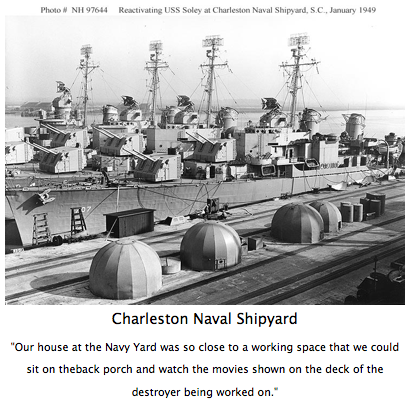
Well, I didn't have a whole lot of experience of that, because he retired when I was about six. He would say, "Clear the decks!" (laughter) There was another admiral in the extended family, and they kept running into each other because they got out of the Academy at the same time, so they'd end up at Coronado, more or less, and Uncle Benny was at Pearl Harbor too, and his stuff can be read online—his memoir of the attack—and he was prone to say "Late hammocks this morning!" And the children knew what it meant, but I didn't have that—"late hammocks" means you don't have to get out of bed at the usual time—but these guys sort of didn't notice they weren't hammocks; they were actually beds. And there was a floor, not a deck!
My father had a very hard decade, really; he had an older brother who died of tuberculosis during the war; the family big house—he was a Yankee, and it was in Ossining, New York, site of another Big House—but the big house burned down during World War II, so here he is, watching the world fall apart, and fighting across the Pacific, and at home everything is pretty much falling apart, too. I think he had struggles with depression...and, he was old when I was born—he was probably close to fifty—so what do you do with a rugrat? (laughter)
Matt Hatch
What do you recollect, then, most about that? What is it about your father from when you knew him—
Harriet McDougal
Distance, sorry to say.
Matt Hatch
And you think that was a product of what you just said?
Harriet McDougal
It was a very hard time for him. He was decent to me. I mean, he fed me and clothed me, and never abused me, but it was not what you call a warm relationship.
Footnote—Maria Simons
"Uncle Benny" was Robert Bentham Simons II—I'm married to his grandson, Robert Bentham Simons IV, and mother of his great-grandson, Robert Bentham Simons V. Harriet's aunt married his brother Albert. He was the captain of the USS Raleigh at Pearl Harbor.
Tags
, -
7
Matt Hatch
How do you think Jim's experience of childhood in Charleston compared to your own?
Harriet McDougal
Well, Jim grew up real poor, and we were not, and I didn't...I mean I grew up in the house I live in now, which is in the best part of town—BIG—I've forgotten whether you were there for the (TarValon.net anniversary visit to Charleston)—
Matt Hatch
I...I haven't. I am coming!
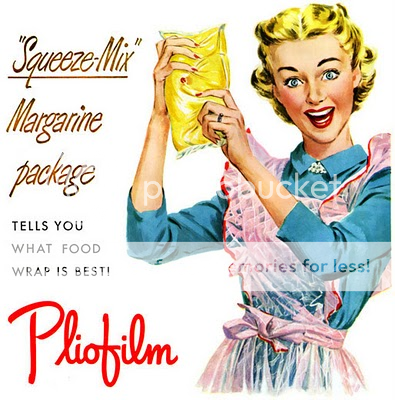
Harriet McDougal
Well anyway, and it was...mother did a lot of yardwork, but she was a snob about food. My best friend lived down the street, and in that house, there was post-WWII margarine, which the dairy people, they controlled it, and it was white stuff in a bag with a yellow pill, and you'd have to mash it through the plastic to make it go yellow, you remember that horrible stuff?
Matt Hatch
Interesting...
Teri Hatch
I remember hearing about it.
Harriet McDougal
Oh, it was...yeah, awful. Mother wouldn't have it in the house, and the only bread she would have in the house was Pepperidge Farm. She really ate and cooked and all of that, and Wilson was saying the other day, he remembered sitting at Jim's mother's table, and supper was mayonnaise sandwiches.
Matt Hatch
(laughs) I loved mayonnaise sandwiches.
Harriet McDougal
Yeah, but mother didn't do that. I lived, really, a live of privilege as a child. Jim's life was not. His father came back from the War, and when they married, his father got a job on the police force, and also painted houses on the weekend to make extra money, so it was pretty hard scrabble. And they then built a house with their own hands outside of town, and unfortunately put chlordane down in the cellar, in the foundation to kill bugs—nobody said it was not such a good thing to do—so it's possible Mr. Rigney's health problems might have had something to do with that. But I think Jim had a happy childhood.
Matt Hatch
Did your mother know Jim?
Harriet McDougal
No; neither of my parents ever met him.
Tags
, , , -
8
Matt Hatch
How about your days at school? Were you involved in clubs, organizations...?
Harriet McDougal
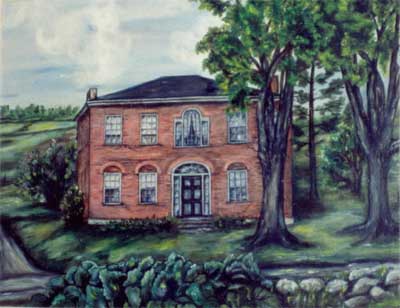
Yes. In high school I was just determined. My parents were talking about sending me off to boarding school, and I thought, well, if you sent me to Putney, I would love that; Putney was the hippie school of the time—and you could go on an experiment of international living, and they had a greased pig race—but they were talking about sending me to St. Timothy's in Virginia, where I knew they would make me wear white gloves, and I wasn't going to go, and I thought, "Well,"—communication was not really a big thing—"I will be so successful at Ashley Hall that they won't send me away," so I did; I joined everything, and was president of everything I could get my hands on, all because I'd figured out home was better. And so I did; I was really a nasty little overachiever in high school, president of the student body—it was a girls' school—French Club, Latin Club. I didn't take part in synchronized swimming, which a friend of mine did; sports were not my thing. I wore the glasses, mostly—besides, you can't play basketball and read at the same time. (laughter) Anything that involved reading was my cup of tea. I think there was a drama club...I don't know.
Matt Hatch
You were everywhere.
Harriet McDougal
Yeah. Anything. See, "Well you can't; I really can't go away; I'm so busy!" It worked!
Matt Hatch
Was it your mother or father that really wanted you to go away? Was it both of them?
Harriet McDougal
Yeah, kind of. I think they thought they were doing a nice thing. And in those days, girls' boarding schools still existed, and I think they must have grown up because they were thought to be better than anything that could be gotten locally, wherever you were locally.
Tags
, -
9
Matt Hatch
Before you became an editor, who were your favorite authors, or favorite books?
Harriet McDougal
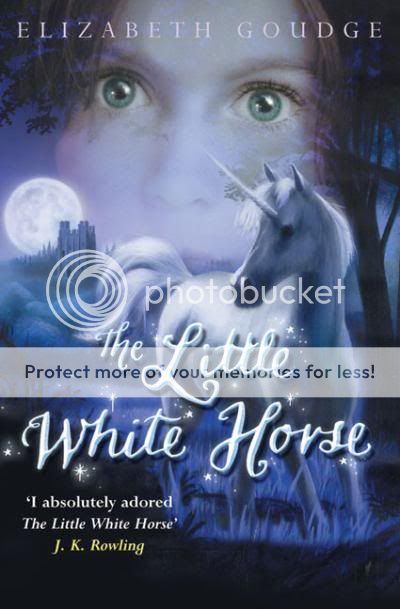
Well, that would be while I was still in school. I had a favorite book as a child called The Little White Horse, by Elizabeth Goudge, who then wrote a number of books for adults. I used to pretend to be sick so I could stay home in bed and read this book over and over and over. It was pretty remarkable, written not long after WWII. A little girl and her desiccated nanny are going to a new place to live, and there's a really wonderful kind of gateway they have to go through, it's like a hole in a cliff and there's a big bluff guy—what it is is a thinly-disguised Brit-loving thing. The man who's head of the household they're going to is obviously John Bull and there's a big dog in the house, but it's a lion, and she sees the little white horse, which has a horn, out of her window, the lion and the unicorn, and then these gypsies, and a stolen pearl necklace, and it's all about reconciling the grown-ups, which tells you another thing about my parents' marriage. (laughter) Anyway, I loved it, and it's full of the porn of food. It was written while rationing still went on, which was well into the 50s, and butter simply drips from every page. (laughter) And I loved it.
That was a big favorite, and I also loved horror comics, until my mother found out where I was buying them, and she told me I was never to go to that drugstore again, and what's more, she went to the drugstore and told them I was not allowed to come in. And to this day, I've been unable to visit that perfectly inoffensive drugstore, which still exists. It's about to close up—not my fault! But I loved them.
Matt Hatch
What's the name of the drugstore?
Harriet McDougal
Well, I don't know the—they know this, and since they're closing up, and feeling blue...they're perfectly nice people. But I did love horror comics. And I borrowed the first Nancy Drew; mother found it and made me take it back; she only wanted me to read Caldecott and Newbery winners. I read a lot of bad Newbery winners.
Matt Hatch
So has your taste changed since then?
Harriet McDougal
Not much, not much. That's why I grew up to edit paperbacks.
Matt Hatch
Today, who do you read when you pick up a book?
Harriet McDougal
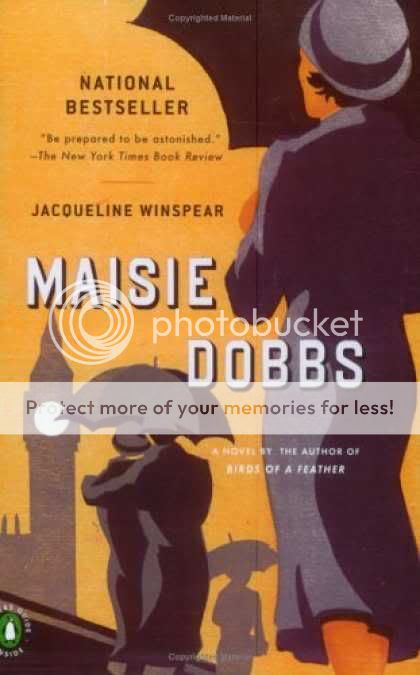
Well, at the moment, I'm fond of Jacqueline Winspear mysteries—they're the Maisie Dobbs mysteries—and she's begun to hit the big time. She's an interesting character; she's a working-class Englishwoman, who saw life as a nurse during WWI, and the books are set between WWI and WWII, which is a period of history I know very little about, and they're fun.
Matt Hatch
Is it the mystery adventure elements that—
Harriet McDougal
It's not particularly—no, it's not adventure; it's figuring out what happened. They're not cosies, exactly, but they're not shoot-em-ups either. Somewhere in between. They're unusual books. I like mysteries, and I've been going through a period of reading oldies. I love Terry Pratchett—I have one with me as a matter of fact.
Matt Hatch
Everyone keeps telling me I need to read them; I just haven't.
Harriet McDougal
Well he's perfectly wonderful, and at times of sadness and trouble, I just think he's a tonic.
Tags
, -
10
Matt Hatch
What was it like to be a female student at Harvard in the age of Harvard-Radcliffe?
Harriet McDougal
That's an interesting question. I thought, "Oh, I dunno, it just was." When you're doing it, in your own experience, it's just sort of there. It was indeed second-class citizenship, but I was very lucky to be there, all at the same time.
Matt Hatch
Did you sense that?
Harriet McDougal
Yeah, both! "Boy, I'm glad to be there", and, "Boy they look down their noses at me." And the president of Radcliffe spoke to the freshman class that I later joined—I transferred in; I went as a sophomore, but I've heard about this—but he said, "Well, we know that the men are here to get bachelor's degrees, but you are here to get the MRS. Let the men...let your husband buy the house for you, and you raise the children."
Matt Hatch
What was the general response from women?
Harriet McDougal
I don't know. That was what he said to the incoming freshmen of Radcliffe; I was not present that day. Actually, the experience of my mother's family after the Civil War was kind of useful, because so many men had been killed, but the women really had to root hog or die. And it was...I think it's why mother picked up a hammer. Nobody's going to do it for you; do it.
Matt Hatch
Did you feel like you were a part of that change, to a place like Harvard-Radcliffe?
Harriet McDougal
No. I was just there.
Matt Hatch
How did you feel about opportunities for women? Did you feel like there were going to be more at the time?
Harriet McDougal
No. It was just—"hmm!" There were no opportunities. When I got home from college, I spent a year at home, getting engaged and unengaged, behaving generally badly. I had a job, and it paid me $42.50 a week. I was assistant archivist at the South Carolina Historical Society. My Uncle Sam, who I loved dearly, shoehorned me into this. There were two employees—the archivist, and the assistant archivist—and we cut the paper, to make a carbon copy, in half for short letters, because that was thriftier—position it behind the carbon copy, type very carefully—and the archivist was a woman. I thought partly because I could see that the job opportunities for me in Charleston were essentially nil, and also because I was behaving badly, and I saw no sign of stopping this, that I had better go to New York to find work, and my bad behavior would be less noticeable. I mean, I had three engagements that year; this is not what was expected behavior. So I did go to New York. Some guy I met at work, actually, said he would give me a letter to the head of copyeditors at at John Wiley & Sons, and I ended up going to work there.
Tags
, , -
11
Matt Hatch
What was it like to be a part of the burgeoning sff field through the 70s and 80s?
Harriet McDougal
Well, I don't know that it was 'burgeoning' so much. It was just...it had been big; it was an established field, and it was fun.
Matt Hatch
What made it so fun?
Harriet McDougal
Writers are fun. Publishing is fun.
Matt Hatch
Did you take a particular interest in science fiction, or was it coincidental?
Harriet McDougal
No. When Ace came along, in fact, I thought, "Hmm. How 'bout this." Because I hadn't really done anything, and I looked at who I liked reading in the field—which I did—and the funny thing was, I mostly liked the women writers.
Matt Hatch
And did you find more female writers in sff?
Harriet McDougal
No, not so many. Judith Merril was there, a wonderful anthologizer. Anne McCaffrey had some early stuff out, but a lot of the guys still had women characters who...who made coffee, you know. They weren't very exciting. Well, I saw that on my own personal bookshelves, there were a number of people I liked, and I kind of, I guess with personal interest I sort of moseyed in from horror, just because I liked it.
Tags
, , -
12
Matt Hatch
When you heard about Jim from the bookshop owner, what was it about him that made you want to leave your contact information for him on an index card?
Harriet McDougal
The bookshop owner said he was working on a bodice-ripper, that's what.
Matt Hatch
Why the bodice-ripper though?
Harriet McDougal
Well, they were huge at the time. And he apparently had said that to her, but he wasn't. (laughter) He just thought, "Oh gosh, Kathleen Woodiwiss got a million dollar bonus; I think I'll try one of those." That's what was going on in his head, and he said, "Yeah, I'm working on one of those," is what came out of his mouth! (laughter)
Footnote
See the full story from this transcript of a Q&A session in Sydney.Tags
, , -
13
Matt Hatch
How long did you work at John Wiley & Sons?
Harriet McDougal
Seven...seven lean years! It's funny the way the...to come back.
Matt Hatch
When exactly did you graduate?
Harriet McDougal
'60, 1960.
Matt Hatch
And when did you marry?
Harriet McDougal
'64.
Matt Hatch
And your first husband was...?
Harriet McDougal
Ed McDougal, and I married him in 1964. And Will, my son, was born in 1968, and I left Ed in 1970, at which point the women's movement had begun to take on steam.
Matt Hatch
And you met him in New York?
Harriet McDougal
Yeah.
Matt Hatch
Was he also in the same industry?
Harriet McDougal
No. He worked at Equitable Life Insurance.
Matt Hatch
And after 1970, when is it that you met Jim?
Harriet McDougal
I think I met him in '78? Yeah. I moved back to Charleston in '77, so...'78, '79, something like that.
Matt Hatch
So in that break between '70 and '78, were you still in New York at that time? You said you had seven lean years; where were you working during that period of time?
Harriet McDougal
Then I moved into trade publishing, which was a lot more fun. I started at Harcourt Brace, where I worked on the first textbook of science fiction ever published. We had a wonderful big editor named Mr. Pullen, and it was his project, and I said, "Can I work on it? Please, please?" And I did; it was fun. And from there, I went to World Publishing, and I've forgotten what they hired me to do...oh, run the copyeditors. And then it was...having one paroxysm after another. And they put me in charge of children's books, having fired a very distinguished children's book department, and it was nuts, which is of course a wonderful learning opportunity. And from there, I went freelance for a while, living in downtown Brooklyn, and realizing Will was, actually, turning four—I didn't have any health insurance, and neither did he, and maybe it was time to stop doing freelance and get a corporate job. And somebody had just left Grosset & Dunlap, and I said, "Well, who's replacing you?" and he said, "I can't even recommend that job to a friend, Harriet." I said, "Nevertheless..." and went and interviewed and got it, and that was where I met Tom Doherty, when I was hired as editor for Tempo Books. But then I began to get angry, because not long after I started working, the President of Grosset said in my presence, "Thank God we've got her instead of Dummy _____!" who was my friend I was replacing, and he had been making fifteen thousand a year, and I was making eleven. "Let me see if I can fight to get a raise to twelve," because I was paying six thousand for child care. Daycare just didn't exist back then. And I began to get pissed off.
Matt Hatch
What did you do?
Harriet McDougal
I put my head down and worked. (laughter) And began to think about how I could get out, and it finally came...what did happen? It was a big mess of family stuff and all, but I could move back to Charleston if I could figure out how to make a buck, and I'd met a guy named Richard Gallen who had been general counsel at Dell, and he had figured out how to tax shelter books, and needed books to tax shelter—there's nothing crooked about this—so he said, "You find the books; I'll give you the money to pay the advance, and see if we can't make money together," and I said, "I'm sorry, I can't; my monthly nut's too high, and I have a child to support, and no help from Ed. None, nada." But the chance to live in the house in Charleston...my sister's child—you don't want to know; it was a real can of bait—and I called Dick and said, "Is your offer still good?" And he said, "Yeah, I'll meet you for lunch tomorrow, and bring a contract." And he did; it was double-spaced, one page. I signed it, and armed with that—and I think I had two thousand dollars in the bank—off Will and I went to Charleston! So it was a pretty wild adventure, but it worked. It had some real poor moments, I'll tell you that.
Tags
, , , -
14
Matt Hatch
What did your parents think about your leaving for New York?
Harriet McDougal
Going to New York? You know, I don't know; they seemed okay with it. I think Daddy liked it cause he'd grown up in New York; he was essentially a New Yorker.
Matt Hatch
Where in New York did he grow up?

Harriet McDougal
Upper West Side. He was born in Perth Amboy, New Jersey, which is—I still don't know, why are there "The Amboys"—I don't know where the name comes from. Anyway, he went to live with—he had an uncle, I believe it was; a great-uncle who had done very well for himself and lived down by Washington Square—and Daddy went to live with him during high school—he went to Trinity School, which still exists on the Upper West Side—and he then got an appointment to the Naval Academy. He told me he stayed in the Navy because he thought he owed the Navy an education, having gone there for free. So they seemed to think it was okay. Mother liked New York.
Matt Hatch
Did she? Did they come visit?
Harriet McDougal
Oh yeah. Not too often, but every time they did, she'd run into somebody she knew on the sidewalk. And Daddy loved the oyster bar in Grand Central; he'd been going to the oyster bar since he was a midshipman.
Tags
-
15
Matt Hatch
When you went to Harvard, did you have any idea that you wanted to be an editor at that time?
Harriet McDougal
Not really. I knew I didn't want to be a teacher, and that seemed to be the only other possibility. I started at Wellesley; they had a major at the time that nobody else, as far as I know, did; it was called International Relations, and it was very structured—languages, poli-sci, history; I forget, but not a free moment—and I wanted to be...I thought that looked good, because I had read a comic strip for some time called Steve Canyon, and there was a character in Steve Canyon named Copper Calhoun. She always wore a satin evening dress, even in the daytime, and she smoked cigarettes in a long holder, and she had her own jet, and a multinational corporation. And she wanted Steve Canyon, who—like a fool—preferred some blonde in a gingham dress, but I thought I could fix that. And I think, "That looks good. I would like that."
I got to Wellesley, and every freshman was given an upperclassman. First thing was, they said, "Well, you have to wear a beanie." And I said "What? A beanie? You want me to wear a beanie?" And I was talking to my big sister, and she said, "Have you thought about a major?" And I said, "Yes, I want to major in International Relations," and she said, "That's a wonderful major!" And I said, "Yeah, I thought it looked good." And she said, "They can always use interpreters at the UN!"
Matt Hatch
That's not what you saw...
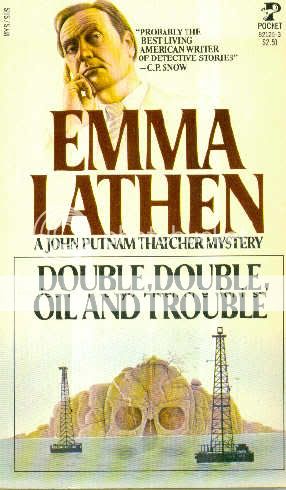
Harriet McDougal
Not at all! And I thought, "If that's so..." And I was dating Harvard boys, who had a lot of freedom around their majors, and I liked that, and I thought, "Well, that dream of being Copper Calhoun is obviously not going to work, so I might as well just settle down and major in English so I can read my way through four years, because after that, it'll be no rest for the wicked, and I will have to work my fingers to the bone to support myself one way or another." So, pretty much that's what I did, and that's why I transferred.
Matt Hatch
It's interesting you went for International Relations, and in the end you switched over to English, and this has all come about because—that was probably a huge moment—that would have been a very different life, if you'd have gone the International Relations route.
Harriet McDougal
Yeah, I'd have been an interpreter at the UN! I did have a good economics teacher at Wellesley; her name Mary Jane Latsis, and she and a friend of hers who was a lawyer wrote some mysteries under the name Emma Lathen, which were very good. Each one—their detective was a trust officer in a Manhattan bank—and each one investigated a different business, so there's one about the oil industry, and things like that. And I got interested in her after I'd left—she was a good teacher, (whisper) but she'd been in the CIA! I was checking her out on Wikipedia, and it said she was an attorney. "No she wasn't; she was an economist!" It was the other half of Lathen that was the lawyer. But that was a nice experience at Wellesley.
Tags
, , -
16
Matt Hatch
So, you have partnered with Tom Doherty on sff books for a long time...
Harriet McDougal
Yeah, I met him at Grosset & Dunlap.
Matt Hatch
...to Ace Books, and obviously to Tor. Can you tell us when exactly you started working with him, and a little about the key to your successful business relationship? So, what is it that meshed you and Tom together?
Harriet McDougal
(pause) I'm not sure. It was just a good partnership.
Matt Hatch
And how did you end up at Ace Books together?
Harriet McDougal
Grosset corporately bought Charter Communications, which was Ace's business identity, and asked Tom to be publisher and me to be editor in chief. Or they told us to.
Matt Hatch
And remind me...Tempo to Grosset & Dunlap...and did you leave? That's when you went back to Charleston?
Harriet McDougal
After Ace. And Tom was founding Tor.
Matt Hatch
At the time you left?
Harriet McDougal
Yeah.
Matt Hatch
When you told him you were leaving, did he try to get you to stay in the area?
Harriet McDougal
Oh yeah. He wasn't too happy about it.
Matt Hatch
And you guys stayed in contact I'm assuming, after you'd gone?
Harriet McDougal
Yeah, and Grosset was in the hands, at this point—very soon thereafter I think it fell into the hands—of one of the worst CEOs known to the publishing industry, Beverly Sills' brother-in-law. His name was Something-Or-Other Sills. I never worked with him, but he was really not good. And one sign of it is that he fired Tom Doherty—you don't fire Tom Doherty if you have any sense—so Dick Gallen called me and said this had happened, and he was thinking about seeing if he and Tom couldn't make some money together, and what would I think about that, and I said, "Do it!" And that's the very tiny seed that grew into Tor. And then Tom wanted me to be editorial director, and I said, "Well, Tom..." And he said, "I don't care where you live. Just edit." And that worked.
Tags
, , -
17
Matt Hatch
So after you had left the home, obviously your mother couldn't stop you from going to the drugstores to pick up those comics later on. What authors did you read in that genre?
Harriet McDougal
Well, I loved Stephen King, of course, and Ramsey Campbell. K.W. Jeter and I worked on some of his stuff, and he gave me credit for turning him around for horror, that that was what he should be writing. I haven't read any in a while. Tomorrow I'll wake up remembering lots of other names. And I also came out of childhood with a real love for cartoons and comics. My best friend's mother was very cute, and when I was nine, she would say now, "Explain this cartoon in The New Yorker to me." So I had this tremendous ego boo about cartoons. And I did edit cartoons—cartoon collections—at Tempo, and I loved that.
Matt Hatch
What were your favorite strips?
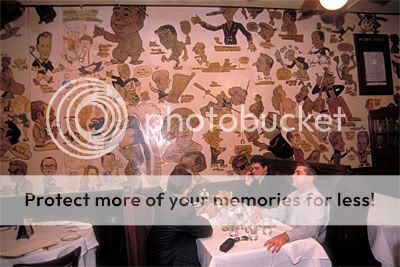
Harriet McDougal
Well I loved Hagar the Horrible, which was new at that point, and Tempo had Beetle Bailey—that was the one that sold best and I paid the most for—and I liked the guy who was selling rights to King Features. At one point, we had a lunch that lasted a long time, and he called me the next morning. He said, "Harriet, did I leave a package with you at lunch?" And I said, "No, I'm sorry John; you didn't." And we were talking later, and I said, "Did you find that package you lost?" He said, "Yeah, I left it at my bookie's." (laughter) So anyway, then along comes the sell piece for Hagar the Horrible, to pitch the strip, and I called up—and I was supposed to go through a rigamarole getting approval for what I bought, and how much I was to spend—and I just called this guy up, and said, "John, I'll pay you what I'm paying for Beetle." And then I said I'd done it. Fire me; I don't care. And of course it was wonderful. And so Dik Browne came and called on me, and I said, "Oh hi, how nice to meet you!" And he said, "Well, nice to meet you! I have come to take you out!" And he took me to a wonderful—The Palm restaurant which was covered with drawings by cartoonists, that is they scrawled all over the plaster. It was fun, and I love cartoons.
Matt Hatch
Still today?
Harriet McDougal
Yeah, I do. I do.
Matt Hatch
I grew up on cartoons, and Hagar the Horrible.
Harriet McDougal
It's wonderful. Chris Browne isn't as good as his father was. It's okay, but not what it was.
Matt Hatch
I'm partial to Calvin and Hobbes.
Harriet McDougal
Yes! Absolutely. Bloom County?
Matt Hatch
My kids don't have the same appreciation any more, for cartoons. It's a different world. I mean, it's probably my fault, for not offering it to them...
Harriet McDougal
What, for not locking them in cages? (laughter) Times change.
Matt Hatch
Yeah, that's right. I mean, cartoons are different; they're 24/7 now, and we don't get a weekly newspaper...it's not the same.
Harriet McDougal
I like Pearls Before Swine. Do you get that? It's a newspaper strip. It's funny.
Matt Hatch
No. I'll have to look it up.
Tags
, , -
18
Matt Hatch
We know you worked on Ender's Game and The Black Company books. Can you tell us some other books you worked on that we might have heard of?
Harriet McDougal
No, I can tell you some writers I worked with—David Drake, Fred Saberhagen, Whitley Strieber...just guys. Lots of guys.
Tags
, -
19
Matt Hatch
Jim said he started missing you after the two of you were done touring for The Fallon Blood, and that's when you started dating. Was he more like Rand, or more like Mat? In other words, did he make a concentrated effort to charm you, or did you just fall into his lap?
Harriet McDougal
He wasn't like either of them; he was like Perrin. Well, he had huge shoulders and curly hair, and he had gone through—he was very gentle because he was so big. If there was ever trouble in a class he was in, in grammar school, the teacher always thought he must have done it because he was so big. So he took a lot of thought before he did things, and that's how he was like Perrin, in both of those ways. And very strong.
Matt Hatch
And do you think he wrote that into Perrin as we know him?
Harriet McDougal
I think he's all of them.
Matt Hatch
But that's the part of him that is Perrin.
Harriet McDougal
Yeah, very gentle. And he did set out to charm me. He was...I remember a moment—well, he was nice to Will, who was a kid at the time, and I remember Will came running upstairs to me one day and—they'd been talking downstairs—and he said, "Ma, he wants to take me to the Star Trek movie. Can I go? Huh? Can I? Huh? Huh?" And I said, "Let me come downstairs with you," and I said, "Can I come too?"
Matt Hatch
Was he surprised when you asked? Or was he...
Harriet McDougal
Oh, I think he said... *mimics pumping her arm in the air* (laughter) If you've ever dated a woman with a child, the first thing you do is get the kid on your side. At the time, I was furnishing a doll's house I had had as a child; it had never gotten properly furnished—and this was really important psychic work I was doing, I guess—and I remember he brought a present to me, and I've forgotten whether it was on Christmas or my birthday—and I was sitting at the dinner table, and he was standing over this small box, and I start to open it, and I realized he was going *heavy breathing noises* because he was so anxious, breathing, would I like it? And it was a really beautiful doll's house dinner table. He spent fifty dollars or something that he really didn't have. But it was that breathing..."Will she like it? Ohhhh..."
Matt Hatch
Was this when you were still dating?
Harriet McDougal
Yeah.
Matt Hatch
And obviously you liked it.
Harriet McDougal
Yes, yes! I liked his caring so much. That's what really got me. I didn't care about the doggone table, that wasn't the point.
Tags
, -
20
Matt Hatch
Your chapter names are beautiful.
Harriet McDougal
Thank you.
Matt Hatch
Did Jim take an interest in them at all?
Harriet McDougal
Not really. He approved them all, and occasionally I'd come up dry, and he'd say, "I dunno." But I never did one without his looking at them.
Matt Hatch
Some of them have double and even triple meanings; Terez wants to know, did you always pick these out of the text, or did he sometimes go back and add extra layers of meaning?
Harriet McDougal
No, no he never did that. Titles came after everything was written.
Matt Hatch
Or are we just imagining these extra layers completely?
Harriet McDougal
Possible. I don't know which ones she's talking about.
Tags
, , -
21
Matt Hatch
How much influence did you have over the prose—voice and tone—at the time of The Eye of the World?
Harriet McDougal
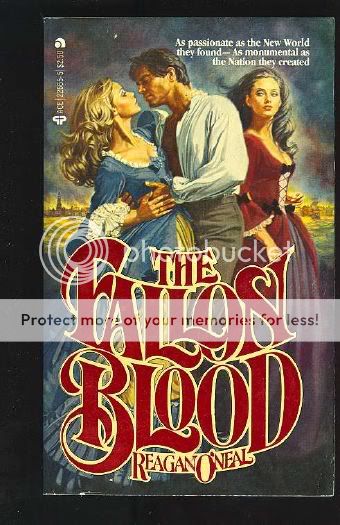
Some, but not major. The first book of his that was published was The Fallon Blood, and it was enormous, and for some reason, it had to be cut. It was going to be published at Ace, and I guess they were just blanching at production costs, and I said, "Well can't we get rid of some of these battles?" And he said, "Harriet, I wounded Michael Fallon, and sent him off to Georgia to recuperate to get rid of a hundred battles. I mean, we really can't; there's no way we can take out any of them." I went, "Oh." So, I said, "There's nothing for it, then; we'll have to take out three lines on every page." And that's what we did.
Matt Hatch
And did you work together on those lines?
Harriet McDougal
Yeah. And a friend asked me to go out to dinner with her and the guy she was dating, although her divorce wasn't final—she wanted me to be a "beard", if you've heard the expression—and I said, "If you help with the snopake!" So we're all on there doing this...but Jim said my nature as an editor...he said, "Harriet, if you were editing Charles Dickens, you would have said, 'Now Charles, you can have "bah", or you can have "humbug", but you can't have both!'" (laughter) And I think it's pretty true.
Matt Hatch
Did that relationship of editing go on through the entire Wheel of Time? In other words, were there all these times you would sit down in The Shadow Rising, and say, "Jim...okay, three lines; we gotta cut three lines out of these."
Harriet McDougal
He'd pretty much learned to do it himself by then, and certainly in The Eye, I would say, "Well, this can go," and he'd say, "Well Harriet, in the fourth book, um..." (laughter) I didn't really realize what I was up against. (whine) "But Harriet, in the third book...in the fifth book...these things have got to be there." (meek voice) "Okay, okay." And he'd learned...he was tightening up his prose by then, a lot. And actually, as the series went on, it got to be...I did almost no pencil-work, and I thought, "Well, man, he's learned everything I had to teach him. He probably needs a new editor now who could put him through new hoops!"
Matt Hatch
What is one major thing you taught Jim about prose, and something you think that helped him become a better writer?
Harriet McDougal
Tight. Write tight. Tighten up. And I think, even editing The Fallon Blood was very good for his prose. It was a vicious small-scale kind of cut, cut, cut. Don't use two adjectives where one will do, and if you can do without any adjectives at all, it's best. Nouns and verbs are where the strength in the writing is.
Tags
, , , -
22
Matt Hatch
Does Rianna's white streak come from you, or is it the other way around?
Harriet McDougal
I have no idea!
Tags
, -
23
Matt Hatch
If you'd like to leave a comment, go to the Theoryland forums.
Thanks for visiting Theoryland.